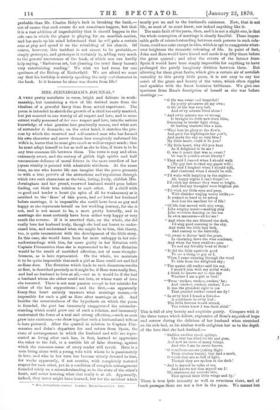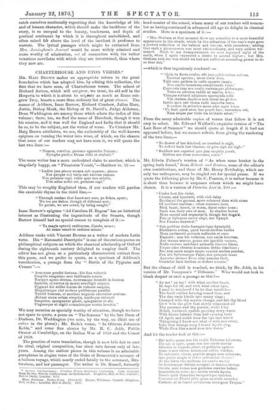MRS. JERNINGHAM'S JOURNAL.*
A VERY pretty novellette in verse, bright and delicate in work- manship, but containing a view of life derived more from the idealism of a graceful fancy than from actual experience. The poem is intended to sketch the growth of a child too early married, but yet married to one worthy of all respect and love, and to some extent really possessed of her own respect and love, into the serious knowledge of what genuine love practically means, and what sort of surrender it demands; on the other hand, it sketches the pro- cess by which the reserved and self-centred man who has formed his own character and never dreamt how completely unformed his wife's is, learns that he must give much as well as expect much ; that he must adapt himself to her as well as she to him, if there is to be any true common life between them. The verse is easy and often extremely sweet, and the ecstasy of girlish high spirits and half unconscious defiance of moral fetters in the mere overflow of her joyous vitality is painted with admirable vividness. At the same time, no one who knows life can imagine that the poem presents us with a true picture of the attractions and repulsions through which two such characters as the vain, loving, lively, childish Mrs. Jerningham and her proud, reserved husband would pass before finding out their true relation to each other. If a child with so good and tender a heart (in spite of all its weaknesses) as is ascribed to the ' Rose' of this poem, had not loved her husband before marriage, it is impossible she could have been so gay and happy as she represents herself on her wedding journey, for she is not, and is not meant to be, a mere pretty butterfly, and in marriage she must certainly have been either very happy or very much the reverse. If it is asserted that, on the whole, she did really love her husband truly, though she had not learnt to under- stand him, and understand what she might be to him, this theory, too, is quite inconsistent with the development of the little story. In this case, she would have been far more unhappy in her mis- understandings with him, far more guilty in her flirtation with Captain Fitzmaurice than she is represented to be ; that flirtation would be the result of mortified affection, not of mere thought- lessness, as is here represented. On the whole, we maintain it to be quite impossible that such a girl as Rose could act and feel as Rose does. The flirtation which leads to such disastrous results at first, is described precisely as it might be, if Rose were really free, and had no husband to love at all,—not as it would be if she had a husband whom she either could not love, or whose want of love she resented. There is not near passion enough in her mistake for either of the last suppositions ; and the first,—an apparently fancy-free heart entirely unaware what marriage means,—is impossible for such a girl as Rose after marriage at all. And besides the unnaturalness of the hypothesis on which the poem is founded, the poet has immensely exaggerated the misunder- standing which could grow out of such a relation, and immensely underrated the force of a real and strong affection,—such as soon grew into existence,—to draw together such a husband and wife as is here pictured. After the quarrel in relation to Captain Fitz- maurice and John's departure for and return from Spain, the state of estrangement in which the husband and wife-are repre- sented as living after each has, in fact, learned to appreciate the other to the full, is a terrible bit of false drawing, against which the common-sense of every reader will revolt. Here is a man living alone with a young wife with whom he is passionately iu love, and who in her turn has become utterly devoted to him, for weeks apparently, if not months, with completely restored respect for each other, yet in a condition of complete estrangement founded solely on a misunderstanding as to the state of the other's heart, and never learning what that really is at all. Apparently, indeed, they never might have learned, but for the accident which * Airs. Jerningnam's Journal. London: Macmillan and Co. 1869.
nearly put an end to the husband's existence. Now, that is not life, as most of us must know, nor indeed anything like it.
The main fault of the poem, then, and it is not a slight one, is that the whole conception of marriage is clearly fanciful. These impas- sable gulfs of misunderstanding between such persons in such rela- tions, could not exist except in idea, which is apt to exaggerate what- ever heightens the romantic colouring of life. In point of fact, John and Rose would have kissed and made it up fifty times before the great quarrel ; and after the return of the former from Spain it would have been simply impossible for anything to have prolonged the purely imaginary division between them. ' But allowing for these great faults, which give a certain air of iaovelish unreality to this pretty little poem, it is not easy to say too much of the grace and beauty of the verse, which often ripples and sparkles with the finest feminine brilliance. We give one specimen from Rose's description of herself as she was before marriage :— "0 life was sweet and beautiful!
Its pretty pleasures all my own; 0 life of life was very full,
And ev'ry minute lived alone !
"And ev'ry minute was so strong,
It brought its little new-born bliss, Sweeping in tender light along, Or leaving shadows like a kiss.
"What lent its glory to the flow'r, And gave the nightingale her pow'r, And made the sky so very blue ? My little heart, could it be you?
" My little heart, why did you beat As if delighted to be me ?
0, was it youth that was so sweet ? Or was it youth's sweet liberty ?
"They said I danced when I should walk (My gay feet worked my gayer will);
They said I laughed when I should talk, And chattered when I should be still.
" I'd wake with laughing in the night- Ah, happy nights I can't forget !- I'd catch my dreams they were so bright, And find my thoughts were brighter yet.
"I'd wink my little eyes and peep, With slumber waging weary strife ;— It seemed so hard to be asleep And lose the smallest bit of life !
" Of life that moved with airy sway, Like singing music—making play Like wavelets dancing on the sea In even measures—all for me !
" And when the sun illumed the dark, I'd sing good morning to the sky, And wake the little lazy lark, And curtsey to the butterfly.
"0, sweet to flutter 'mid the grass, In charming dews the wise condemn, And when the busy swallows pass To nod my friendly bead at them!
"It did the little squirrels good To see a thing as gay as I, When I came running through the wood To hide from the delighted sky; "The quaint old cuckoo said his say, I mock'd him with my artful word; I think ho knows not to this day Whether I am a girl or bird !
"'Twas cuckoo, cuckoo, cuckoo,' he ; And 'cuckoo, cuckoo, cuckoo,' I ;- It was the grandest sight to see That puzzled cuckoo round me fly!
" In ev'ry bird I found a friend—
A confidante in ev'ry leaf ;
The little breezes would attend,
The robins knew I was their chief."
This is full of airy beauty and exquisite gaiety. Compare with it the three verses which follow, expressive of Rose's anguish of hope and sorrow during the delirium of her husband when stretched on his sick-bed, as his aimless words enlighten her as to the depth of the love that she had doubted:— "Sudden another epoch springs,
The first has lived its life and goes, And now he raves of many things, And who I am he never knows.
"0 wond'rous arrows (taking flight From aimless hands), that find a mark, 0 words that are so full of light, Though they are spoken in the dark!
"And to myself he talks of me, And knows not that myself am I!
His sentences set sorrows free, That spread their little wings and fly."
There is true lyric intensity as well as sweetness there, and of such passages there are not a few in the poem. We cannot but catch ourselves continually regretting that the knowledge of life and of human character, which should make the backbone of the story, is so unequal to the beauty, tenderness, and depth of poetical sentiment by which it is throughout embellished, and often raised fai above the level of the incident it professes to narrate. The lyrical passages which might be extracted from Mrs. Jerningham's Journal would be more widely admired and more worthy of admiration, out of connection with the rather vexatious novellette with which they are intertwined, than where they now are.



































 Previous page
Previous page